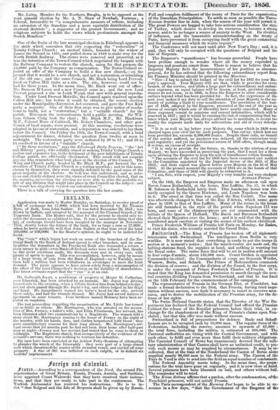IRELAND.
Application was made to Master Murphy, ou Saturday, to receive proof of a bill of exchange for 17,0004 which had been received by Mr. Thomas Eyre, of Bath, from John Sadleir. It was dated November 26, 1855 ; was drawn by Sadleir, and accepted by the manager of the Clonmel branch of the Tipperary Bank. The blaster said, that for the present he should only re- ceive the document as exhibited to him. It was a monstrous thing that this bill of exchange should have been accepted by the manager in November 1855, shortly before the failure of the bank, for so large a sum as 17,000/., when he knew perfectly well that John Sadleir at that time owed the bank 200,0001. or 250,0001. In the Master's opinion, he ought to be indicted for fraud.
The "run " which began last week on some of the branches of the Na- tional Bank in the South of Ireland spread to other branches, and in some localities the depositors in the Provincial Bank also demanded a return o -their money in gold—even Bank-of-Ireland notes were refused. But, thanks to the" great exertions made,. the demands were met in every case, with plenty of specie to spare. This was accomplished, however, only by means of a large dram of coin from the Bank of England—up to Tuesday, more than half a million had been withdrawn in sovereigns to meet the Irish demand. The panic appears to have arisen solely from a misconception of the effect of the Lord Chancellor's decision on the liability of shareholders. The latest accounts report that the " run" is at an end.
Mr. Galbraith Joynt, a gentleman of property at Mount St. Catherine, near Limerick, has been attacked by an assassin. Mr. Joynt was driving homewards in the evening, when a villain fired at him from behinda hedge ; several shots passed through Mr. Joynt's leg, and others lodged in his thigh and hand. He immediately turned his horse's head for the city, arrived there safely, and had the wounds dressed. Mr. Joynt had served notices of ejectment on some tenants. Four brothers named Moloney have been ar- rested on suspicion.
The last proceeding regarding the assassination of Mr. Little has turned out as futile as others. Mr. Harrington, who was arrested on the accusa- tion of Mrs. Feeney, a tailor's wife, and Eliza Fitzsimons, her servant, has been liberated after two examinations by a Magistrate. The women told a story about Mr. Harrington coming to the house of Feeney on the night of the murder, with his hands, face, and clothes bespattered with blood : they gave unsatisfactory reasons for their long silence. Mr. Harrington's ser- vant swore that for months past he had not been from home after half-past nine at night—Feeney and her servant had stated that he came to them at midnight. The Magistrate stated, that irrespectively of the evidence of the accused's servant, there was nothing to warrant his detention.
Six men have been convicted at the Arklow Petty-Sessions of attempting to plunder the wreck of the Irrawaddy they were part of a large armed mob which threatened the master of the stranded vessel, and carried off some property. A fine of 50l. was inflicted on each culprit, or in default six months' imprisonment.


























 Previous page
Previous page